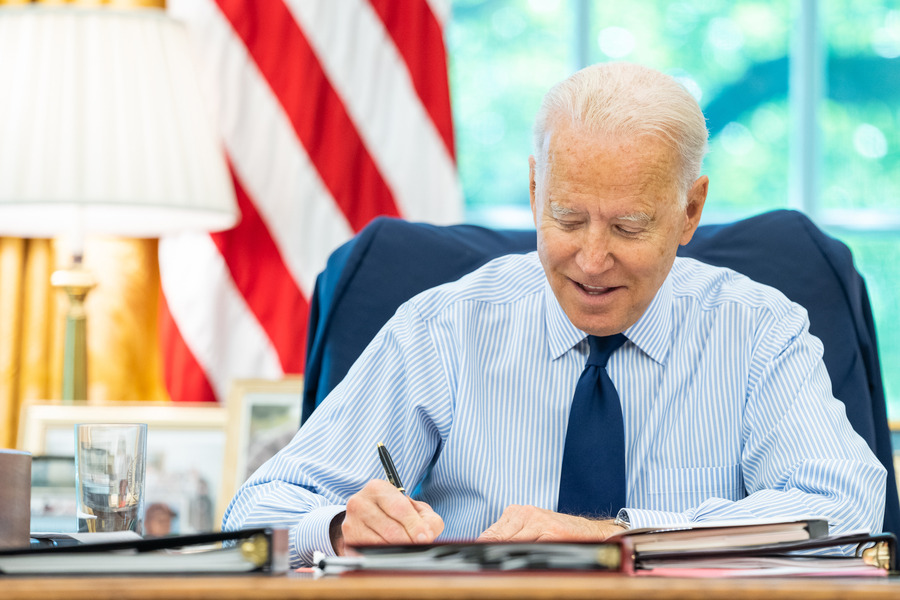Uthman Oral Argument Preview
Tomorrow morning, a panel of the D.C. Circuit Court of Appeals will hear arguments in another Guantanamo habeas case, that of Uthman Abdul Rahim Mohammed Uthman (Case No. 10-5235). The case, captioned under Abdah v. Obama, is a government appeal of the ruling by U.S.
Published by The Lawfare Institute
in Cooperation With

Tomorrow morning, a panel of the D.C. Circuit Court of Appeals will hear arguments in another Guantanamo habeas case, that of Uthman Abdul Rahim Mohammed Uthman (Case No. 10-5235). The case, captioned under Abdah v. Obama, is a government appeal of the ruling by U.S. District Judge Henry Kennedy from last spring granting the writ to Uthman, a Yemeni the government believes to be an Al Qaeda fighter. The case was the subject of extensive coverage by Propublica's Dafna Linzer (here and here). And it is important for at least two reasons. First, as Dafna reported, Uthman is one of the 48 detainees (now down to 47 with the death of Awal Gul) whom the Obama administration considers too dangerous to release but impossible to bring to trial; to my knowledge, he is the only one of this group of detainees to have won a habeas case at the lower court--though as an alert reader points out, Mohammedou Salahi may have fit in this category before the D.C. Circuit vacated his district court win. This makes the appeal a relatively high-stakes matter for the government. On a legal level, moreover, his case presents important questions concerning both the definition of the detainable class of individuals and how the district court should weigh constellations of evidence that are consistent with, but do not directly prove, membership in an enemy group. To put the matter simply, Uthman's case will test how serious the D.C. Circuit is about some of the principles it outlined in its dramatic Al Adahi opinion last summer.
The government considers Uthman to be a serious bad guy--someone who was recruited into Al Qaeda in Yemen, traveled to Afghanistan, became a body guard for Osama Bin Laden, fought with Al Qaeda at Tora Bora, and was captured with numerous other Al Qaeda fighters fleeing the area. It managed to convince Judge Kennedy, however, of only a fraction of this. As Judge Kennedy summarized the case,
In sum, the Court gives credence to evidence that Uthman (1) studied at a school at which other men were recruited to fight for Al Qaeda; (2) received money for his trip to Afghanistan from an individual who supported jihad; (3) traveled to Afghanistan along a route also taken by Al Qaeda recruits; (4) was seen at two Al Qaeda guesthouses in Afghanistan; and (5) was with Al Qaeda members in the vicinity of Tora Bora after the battle that occurred there.
On this basis, he concluded that,
Even taken together, these facts do not convince the Court by a preponderance of the evidence that Uthman received and executed orders from Al Qaeda. Although this information is consistent with the proposition that Uthman was a part of Al Qaeda, it is not proof of that allegation.
On appeal, the government urges four major grounds for reversal. First and most fundamentally, it contends, Judge Kennedy applied the wrong legal standard to the case:
The district court required the government to establish that Uthman was part of the "command structure" of al-Qaida and stressed that the government failed to establish that Uthman fought in battle. This Court, however, has explicitly rejected each of those requirements.
The D.C. Circuit, the government emphasizes, has adopted a functional test of Al Qaeda membership, one that is far less demanding than the test Judge Kennedy applied. His unduly restrictive vision of the government's detention authority, the government argues, caused him to downplay evidence--like Uthman's guesthouse stays and his presence at Tora Bora--that should have been highly salient in a more functional analysis.
Under the proper legal standard, the government goes on to argue, Uthman is clearly detainable:
At bottom, the district court's own findings of close association with other al Qaida members, taken together with the findings of travel to Afghanistan along a route also taken by al-Qaida recruits, visits to al-Qaida guesthouses, and presence with other al-Qaida members in the vicinity of Tora Bora, require a conclusion that Uthman is properly detained as part of al-Qaida. The district court reached the opposite conclusion only by imposing a command structure test and a fighting requirement, both subsequently rejected by this Court. Once the proper standards are applied, the district court's own findings, considered along with the evidence it credited, mandate denial of the writ.
The government further complains that Judge Kennedy did not consider it a strike against Uthman--or in favor of the government's cases--that he offered a non-credible cover story. In Al Adahi, the D.C. Circuit insisted that non-credible detainee explanations of their conduct can be evidence in the government's favor. Yet in this case, "Although the district court found some of Uthman's statements to be unbelievable, it failed to properly consider Uthman's various false and implausible exculpatory statements in determining whether the government had carried its burden by a preponderance of the evidence."
Finally, the government complains that Judge Kennedy did not engage in the "conditional probability" analysis required by Al Adahi--that is, did not examine whether facts were more likely to be true in light of facts already established:
A court cannot "toss[] aside" a fact that does not itself prove that a petitioner is part of al-Qaida or the Taliban and then consider the next fact "as if the first did not exist." Al-Adahi, 2010 WI.. 2756551, *3. Rather, a court must look at all of the facts linking a petitioner to al-Qaida together, and examine the "conditional probability" of his being part of al-Qaida based on that totality of the evidence.Contrary to this precedent, the district court here improperly disregarded individual inculpatory facts, which it considered individually to be inconclusive, without considering the evidence as a whole.
Unsurprisingly, Uthman's counsel regard none of these arguments as compelling. Their argument begins with the general observation that Judge Kennedy conducted an exhaustive and thorough review of the facts and rejected most of the government's allegations as unsupported. His findings, Uthman's lawyers argue, are not clearly erroneous and thus must not be disturbed on appeal:
Importantly, the Government makes no claim that any of the district court's findings are clearly erroneous. The Government nonetheless reargues the facts, urging positions that were thoughtfully and justifiably not accepted by the district court.
In the view of Uthman's lawyers, "the district court must be affirmed unless there is a showing that its decision rests on an error of law." They turn then to the government's asserted legal errors, rejecting each in turn.
The suggestion that the court applied the wrong legal standard for Al Qaeda membership--a command structure test instead of a functional test--is, they say, "based on a fiction":
The Government argues that the district court "required" the Government to "establish that Uthman was part of the [al Qaeda] 'command structure'" or "fought in battle," and that the court ruled that "the government must provide evidence" that Uthman operated within al Qaeda's "formal command structure." . . . It is clear on the face of the opinion, however, that the district court imposed no such requirements.The phrase "command structure" does not even appear in the district court's opinion. Nor does anything in the opinion states that the court required proof that Uthman was operating within any such structure or actually fought in battle in order to justify his detention.
They likewise reject the Government's claim that under a proper reading of the law, the findings Judge Kennedy made require a denial of the writ--both because they deny that the district court applied the wrong test in the first place and because, they argue, "the Government completely mischaracterizes what the district court actually did and the findings it actually made." The five above-quoted factual points mentioned in Judge Kennedy's conclusion, they contend, were not findings of fact but merely points Judge Kennedy did not entirely reject. "In fact, . . . some of this evidence was weak, or balanced by conflicting evidence, and it explained why even viewed together this evidence was insufficient to show that Uthman more likely than not was part of al Qaeda."
Nor, argue Uthman's counsel, did Judge Kennedy fail to hold Uthman's lack of credibility against him. Rather,
the district court considered and weighed the evidence regarding Uthman's statements in deciding that the Government failed to meet its burden of proof. At no point did the court find that any statement by Uthman was false.
While it found some of his statements "less than entirely believable," they argue, "This is not a case, like Al-Adahi, where the district court 'failed to make findings about' the petitioner's credibility and account of his activities." Rather, the court did so and specifically rejected the notion that it should hold Uthman's credibility as a fact in the government's favor.
Finally, Uthman's lawyers dismiss the government's suggestion that Judge Kennedy failed to look at the evidence as a whole, noting that he "repeatedly and explicitly stated that [he] had considered the evidence before [him], taken together, in determining whether the Government had satisfied its burden." Judge Kennedy, they argue, "did precisely what the Government accuses [him] of failing to do: [he] considered all the evidence, as a whole, and determined that the evidence did not demonstrate that Uthman was, more likely than not, part of al Qaeda."
I will file an account of the argument as soon as I can tomorrow--though a series of other obligations may make that somewhat later than my usual argument dispatches appear. Based on the briefs, however, here are some preliminary observations. The government's strongest argument is its claim that Judge Kennedy applied the wrong test, and there is a lot of verbiage in his opinion that supports the government's claim that he was applying a more rigorous standard than the D.C. Circuit has since applied. Uthman's strongest argument is that none of Judge Kennedy's findings are clearly erroneous. The result is that the case may come down to a test of whether, using the relaxed D.C. Circuit standard of functional membership, the facts that Judge Kennedy found (if he, in fact, found them) really amount under Al Adahi to a conditional probability of Uthman's being "part of" Al Qaeda. Because the facts he found are relatively spare and relatively vague, a victory for the government based on the factual record found by the lower court would dramatically shift the balance of detainability in the government's favor. After all, as detainee counsel point out, this is not a record, like Al Adahi, that shows a detainee hanging around with Osama Bin Laden. If we assume only the fact that Judge Kennedy found, it is a record that shows a detainee associating with Al Qaeda people and behaving in a fashion consistent with the behavior of Al Qaeda fighters. If Uthman is detainable on this record, a great deal more detainees will lose their habeas cases than if he is not detainable on this record.
The case will be argued before a panel consisting of Judges Merrick Garland, Thomas Griffith, and Brett Kavanaugh. The argument will begin in open session and proceed, if necessary to discuss classified material, to a closed session afterwards. Dana Kaersvang will argue for the government. Anthony J. Phillips will argue for Uthman.
UPDATE: Clarification added concerning Salahi.
Benjamin Wittes is editor in chief of Lawfare and a Senior Fellow in Governance Studies at the Brookings Institution. He is the author of several books.





